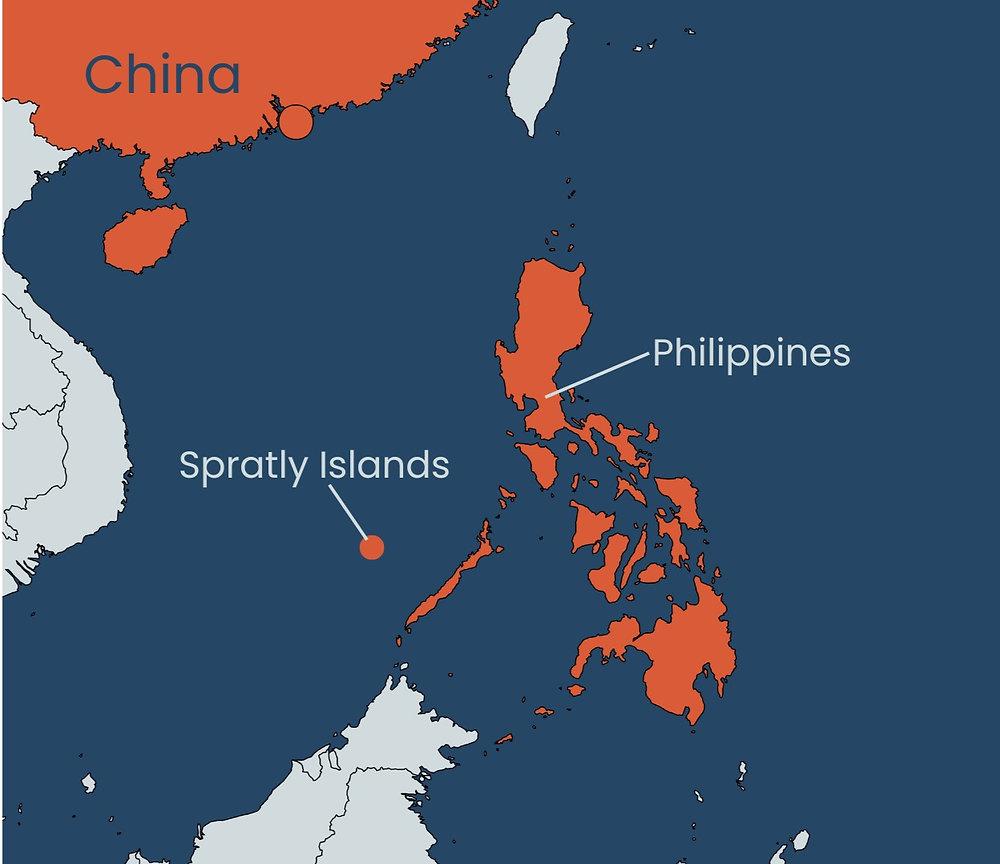
Philippines Alleges China Rammed Its Vessel Off Spratly

The Philippines has accused a Chinese coast guard ship of deliberately ramming and deploying a water cannon on a Philippine government vessel near Thitu Island in the disputed Spratly archipelago, causing minor damage but no injuries, according to Manila's coast guard.
Manila says three Philippine government vessels were anchored off Thitu to support local fishermen when Chinese ships approached and fired water cannon. One Chinese coast guard ship is alleged to have rammed the stern of the Philippine vessel BRP Datu Pagbuaya after using the water cannon. China, however, claims the Philippine vessels“illegally entered” waters near Sandy Cay and caused the collision by dangerous manoeuvres.
Beijing condemned Manila's accusations as a distortion of facts, stating that the Philippine boats ignored repeated stern warnings and violated Chinese territorial waters. According to the Chinese coast guard, the Philippines bore responsibility for the collision.
The U. S. embassy in Manila weighed in, denouncing China's actions as“dangerous ramming” and stressing support for the Philippines in upholding maritime rights under international law. Philippine officials vowed to press diplomatic action while continuing patrols to protect Filipino fishermen's access in the area.
Experts tracking the South China Sea dispute see this episode as part of an intensification of maritime confrontations. Overlapping claims by China, the Philippines, Vietnam, Malaysia, Brunei and Taiwan have long made the region volatile, especially around fishing zones and strategic shipping routes.
In August, a high-speed pursuit near Scarborough Shoal resulted in a China Coast Guard cutter and a Chinese naval vessel colliding while chasing a Philippine patrol. That incident injured none but raised alarm over the risks of escalation.
See also Hong Kong's Overnight Funding Cost Breaks Above 5 %Manila's strategy has increasingly leaned on international legal norms, especially the 2016 ruling by a Hague tribunal that rejected China's sweeping maritime claims under the“nine-dash line.” Beijing refuses to accept that decision and has steadily expanded coast guard deployments, artificial island construction, and maritime militia activity.
Analysts suggest that China's recent operations indicate a shift towards more assertive enforcement in its claimed seas. Pressure tactics such as water cannon use, ramming, and vessel interdiction are becoming more frequent in contested zones. Philippine officials contend such tactics intimidate local fishing communities and undermine sovereign rights over their exclusive economic zone.
Diplomatic watchers note that the timing of these clashes often aligns with Chinese domestic political or military posturing, especially as Beijing seeks to reinforce its claims ahead of international scrutiny. For its part, the Philippines has stronger backing from Washington, and its defence and coast guard are gradually upgrading capabilities and interoperability with allies.
Notice an issue? Arabian Post strives to deliver the most accurate and reliable information to its readers. If you believe you have identified an error or inconsistency in this article, please don't hesitate to contact our editorial team at editor[at]thearabianpost[dot]com . We are committed to promptly addressing any concerns and ensuring the highest level of journalistic integrity. Legal Disclaimer:
MENAFN provides the
information “as is” without warranty of any kind. We do not accept
any responsibility or liability for the accuracy, content, images,
videos, licenses, completeness, legality, or reliability of the information
contained in this article. If you have any complaints or copyright
issues related to this article, kindly contact the provider above.
Most popular stories
Market Research

- Crypto Market Update: Pepeto Advances Presale With Staking Rewards And Live Exchange Demo
- Kucoin Appeals FINTRAC Decision, Reaffirms Commitment To Compliance
- Cregis And Sumsub Host Web3 Compliance And Trust Summit In Singapore
- Chartis Research And Metrika Release Comprehensive Framework For Managing Digital Asset Risk
- Nodepay Launches Crypto's Largest Prediction Intelligence Platform
- Schoenherr Opens London Liaison Office As Gateway To Central Eastern Europe




















Comments
No comment